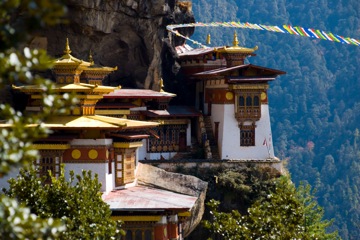From Bhutan to France: Gross National Happiness
Eric Weiner: On the intersection of place, politics and culture
10.09.09 | 12:26 PM ET
 iStockPhoto
iStockPhotoPeople travel. We know that. Stuff travels, too, of course. So do germs. Less obvious is the fact that ideas also travel. They don’t always travel well, and their on-time performance is no better than your average U.S. airline. But, still, travel they do—and often in expected ways.
Take French President Nicolas Sarkozy’s recently proposed “happiness index.” The traditional measure of a nation’s wealth, Gross Domestic Product, is woefully inadequate, Sarkozy declared, and promptly ordered French bureaucrats to take into account factors such as quality of life, the environment and (gasp!) vacation time. What the world needs, Sarkozy said in so many words, is not Gross National Product but Gross National Happiness.
Hmmm, this sounds familiar. As you may know, Bhutan, a geopolitical speck tucked away in the Himalayas, adopted exactly that policy—Gross National Happiness—back in the 1970s. At the time, it made for a cute headline but the rest of the world was too busy counting its cash to pay much notice. Not deterred, Bhutan went its own merry way, hosting conferences on Gross National Happiness (GNH), dispatching emissaries around the world to make happy talk and, in general, bucking the notion that money is king.
Slowly, GNH caught on. Former British Prime Minister Tony Blair established an unofficial Department of Happiness, directing his advisers to explore how findings from the “science of happiness” can help shape policy. The idea then floated across the English channel and—voila!—was transformed into a French idea. No surprise there. Politicians everywhere perpetuate the myth that all ideas are home-grown. The truth is that no idea is truly purebred. All ideas are mongrels, and that’s something for which we should be grateful. By bouncing around the world, across time and cultures, ideas evolve more quickly and robustly than if they leavened in one spot.
Bhutan’s (or is it France’s?) Gross National Happiness is, I think, a particularly good idea. What we measure matters, and we’ve been measuring national wealth far too narrowly for far too long. In the crude calculus of GDP, hurricanes, prisons and toxic spills all contribute to our bottom line. GDP takes into account everything, Robert Kennedy once said, “except that which makes life worthwhile.” Gross National Happiness attempts to correct that imbalance. Not an easy task, but a worthy one.
Predictably, some critics have accused the French of trying to rig the game. “The oldest and most pathetic trick in the book when you lose a contest is to try to move the goal posts,” wrote economist Brian Domotrovic, in a Wall Street Journal op-ed. Yes, it’s true that when it comes to vacationing and cafe sitting, the French are indeed world class, but Gallic joi de vive is overrated. The fact is that France ranks among the least happy nations in Western Europe.
Bhutan, on the other hand, I found to be a content (though not perfect ) place. People there value relationships more than money, and from a happiness perspective, that’s smart. Researchers consistently find that it is the quality of our relationships, not our bank balance, that most determines our happiness.
Call it the trickle-up theory of ideas. Big ideas often start in small nations. For instance, the wildly successful practice of micro-lending was born not in London or Tokyo but rural Bangladesh. Why? Necessity, yes. But another reason, I think, is that small, off-the-map countries have less to lose. If Bhutan proposes something like Gross National Happiness people might snicker but they’re not likely to think of any less of Bhutan. Partly, this is because they had never thought of Bhutan at all. And partly it’s because we expect global outliers to come up with wacky ideas.
So I’m glad that Bhutanese happiness has traveled to France. Let’s hope the journey doesn’t end there.![]()
Parisgirl 10.09.09 | 3:07 PM ET
Having recently been in Bhutan - and returning directly from Bhutan to France, I have to admit - there’s all sorts of happy, but quite honestly, I don’t think the average Parisian would settle for ‘happy’. ‘Bonheur’, bliss, ecstasy, oh yeah. Has President Sarkozy forgotten his compatriots’ voracious appetite for the good life - we call it ‘joie de vivre’ which goes a step beyond ‘happy’.
karma Gyeltshen 10.11.09 | 10:39 PM ET
The Country “Bhutan “ Expressed in the unique development philosophy –Gross National Happiness – the national policy of high value, low volume tourism asks every visitor to be sensitive to a social, cultural, and environmental system that is trying to preserve the best of its traditions in a rapidly changing world. The Government is determined to safeguard its heritage to ensure that the people maintain their dignity against the onslaught of globalization and modernization.www.go2bhutan.com
Makye Ame 10.12.09 | 6:41 AM ET
Eleanor Roosevelt said that happiness is a byproduct, not a goal. And I agree - you’ll chase happiness all your life if you try to measure it. Live your life earnestly and other things will follow
Parisgirl 10.15.09 | 1:21 PM ET
How beautifully expressed - and thank you for reminding me of Eleanor Roosevelt’s comment. I’m going to keep in mind that phrase “Live your life earnestly and other things will follow” thanks!
france 10.31.09 | 11:24 AM ET
Seeing France and the tourist attractions there was the best things I ever did. The greatest vacation of my life.